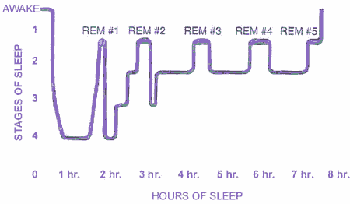|
The
Sleep Cycle
One
sleep cycle comprises of four stages and lasts for about 90-120
minutes. Note that some books list five stages in the sleep cycle. These books
consider the first five to ten minutes when you are falling asleep as a stage in
the sleep cycle. We think this is more of a transitional phase and not really
part of the cycle, especially since this stage of sleep does not repeat itself,
while the other four stages do repeat themselves throughout the night. For this reason,
we have excluded as part of the cycle.
Dreams
can occur in any of the four stages of sleep, but the most vivid and
memorable dreams occur in the last stage of sleep (also commonly referred
to as REM sleep). The sleep cycle repeats itself about an average of four to
five times per night, but may repeat as many as seven times. Thus, you can see
how a person has several different dreams in one night. However, most people
only remember dreams that occur closer toward the morning when they are
about to wake up. But just because you can't remember those dreams do not
mean that they never happened. Some people believe that they simply do not
dream, when in reality, they just don't remember their dreams.
The
Stages Of Sleep
The
stages in the sleep cycle are organized by the changes in specific brain
activity.

Stage
1: You are entering into light sleep. This stage is
characterized by Non-rapid eye movements (NREM), muscle relaxation, lowered body
temperature and slowed heart rate. The body is preparing to enter into deep
sleep.
Stage
2: Also characterized by NREM, this stage is
characterized by a further drop in body temperature and relaxation of the
muscles. The body's immune system goes to work on repairing the day's damage.
The endocrine glands secrete growth hormones, while blood is sent to the muscles
to be reconditioned. In this stage, you are completely asleep.
Stage
3: Still in the NREM stage, this is an even deeper
sleep. Your metabolic levels are extremely slow.
Stage
4: In this stage of sleep, your eyes move back and
forth erratically as if watching something from underneath your eyelids.
Referred to as REM sleep or delta sleep, this stage occurs at about 90-100
minutes after the onset of sleep. Your blood pressure rises, heart rate speeds
up, respiration becomes erratic and brain activity increases. Your involuntary
muscles also become paralyzed or immobilized. This stage is the most restorative
part of sleep. Your mind is being revitalized and emotions is being fine tuned.
The majority of your dreaming occurs in this stage. If you are awakened during
this stage of sleep, you are more likely to remember your dreams.
These
stages repeat themselves throughout the night as you sleep. As the cycle
repeats, you will spend less time in stages 1 to 3 and more time dreaming in
stage 4. In other words, it will be quicker and quicker for you to get to stage
4 each time the cycle repeats.

|

